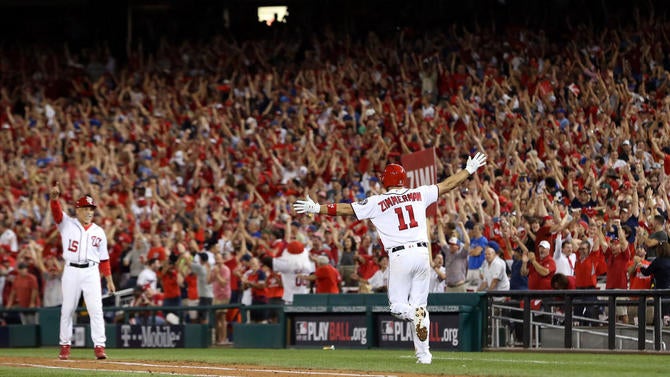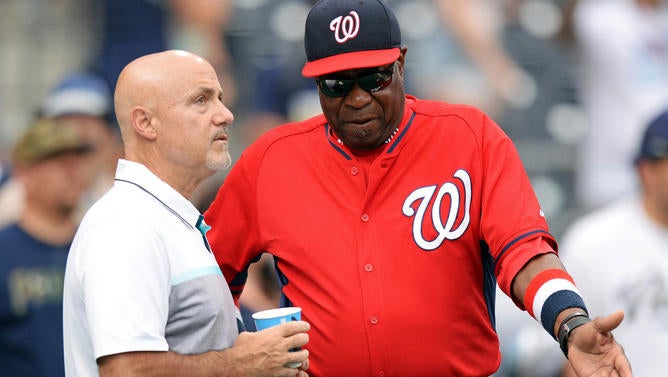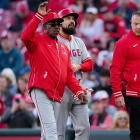The Washington Nationals and Chicago Cubs will play their seasons' most important contest on Tuesday, formally known as Game 4 of the National League Division Series. With a victory, the Cubs will advance to the League Championship round to compete for a place in the World Series. Meanwhile, a loss means the Nationals will enter a hibernative state until next spring.
For that reason and others, the Nationals have more at stake than the Cubs do. Keep in mind, these are crucial times for Washington. The Nationals will soon have to contend with manager Dusty Baker's expiring contract and franchise cornerstone Bryce Harper's 2018 date with free agency. Plus, there's weighty history to think about -- they haven't won a postseason series in their existence, and D.C. has not celebrated a World Series win since 1924.
Complicating the Nationals' attempted trek to the promised land is the fact that one of the organization's architects won't be in attendance at Wrigley Field for Game 4. He won't be in D.C., either -- or in any baseball setting. That's because former assistant general manager Adam Cromie walked away from his post earlier in the year to pursue a legal career.

Getting in the door
Unfortunately for the tabloids, Cromie's departure from the Nationals was clean and anticipated. In fact, his leap to law had been more than a decade in the making.
When Cromie was growing up, he saw two futures for himself: one involved becoming a baseball executive, the other a lawyer. The Cherokee parable about two wolves comes to mind (the winner is the one who is fed), but that doesn't apply here. Unlike most people, Cromie was lucky and privileged enough to find a way to feed both his wolves -- just at different stages in his life. "For a 21-year-old kid who felt like there was all the time in the world to pursue all of my interests," Cromie told CBS Sports, "baseball seemed like the logical place to start."
Cromie's baseball education began during his days as an undergraduate student at Allegheny College. He needed to write a thesis to graduate with a degree in economics. Because Moneyball was all the rage then -- in business and baseball circles -- he was able to forge ahead by writing about how individual organizations used their minor-league systems to gain a competitive advantage. "It was the kind of study that someone with SQL Database and just a little bit of data can run in one day," he said. "But it took me six months to gather the data and put it together and run an analysis."
A good story would have Cromie being hired by an open-minded general manager who read his thesis and decided he was the next Paul DePodesta. That's not what happened.
Rather, Cromie went on to the University of Massachusetts Amherst, where he earned his master's degree in sports management. He'd intern with Baseball Info Solutions and an independent league team, though neither of those opportunities led to a big-league gig. From there, he nearly walked away from baseball before getting his shot in a real front office.
"I went and attended two separate winter meetings, and was unable to even land an internship with a major-league club," Cromie said. "At the end of that process, I moved back to Amherst and worked with a few faculty members who have their own agency in the New England area, and started to think about going back to law school at that point."
Cromie did more than think about it -- he acted on it. He was far enough down the legal path that he'd already sent in his deposit when he reached an inflection point prior to the 2007 season.
"I got a phone call from Mark Scialabba, who is the [director of player development] now for the Nationals, and a former classmate of mine at UMass, asking me if I was willing to move to Florida, work for free, and maybe get a job somewhere down the road," Cromie said. "My initial answer was no. He's a very close friend, and I told him, 'Look, I've been looking for a job in baseball for two years, I haven't landed anything. I'm pretty set continuing down this other path.
"Needless to say, I slept on it, woke up the next morning, and realized what a foolish decision I'd be making if I didn't pursue what at that point was really my dream, which was to go work in baseball."

Making the most of the chance
Once Cromie joined the Nationals, he moved up about as quickly as he moved around. He worked in various areas, from player development to baseball operations. Eventually, in October 2010, he was named the director of baseball operations and analytics. By then, Cromie had made an impression on most everyone he'd come in contact with -- including his predecessor.
These days, Jay Sartori is the Detroit Tigers senior director of baseball analytics and operations. Back in 2009, he was the Nationals director of baseball operations. It was then that he met Cromie. "When I first met Adam, it was pretty obvious pretty quickly that he was a very smart person with a really driven work ethic and desire to get better," he told CBS Sports, acknowledging that the two remain good friends, despite having worked together for just a year.
Sartori isn't the only baseball executive willing to praise Cromie. Others in front offices of rival teams viewed Cromie as a potential future GM due to his skill set and experience across roles.
Brian Cartwright, who provides college and foreign-league data to various teams, was introduced to Cromie by Dan Fox, the Pittsburgh Pirates director of baseball informatics. The two became friendly from there, Cartwright said, while praising Cromie's generosity and intelligence. "We'd sit for hours asking each other questions," Cartwright said. "He'd personally go to conferences and keep up on current topics and research being presented on the web. One time, Alan Nathan was giving a talk at the University of Maryland and Adam asked if he wanted to come by the offices and also asked if I wanted to join. After he gave us a tour of the stadium, the three of us spent an afternoon in the conference room talking about fine points of baseball analysis."
Cromie later employed Cartwright on various research projects. He tried hiring Cartwright, too, but couldn't afford to pay what Cartwright needed to leave his job.
Cromie did find the budget room to fatten the Nationals analytics staff through other means, hiring well-regarded quants like Sam Mondry-Cohen and Michael Debartolo. The trio provided a different perspective in a front office loaded with scouting knowledge. The Nationals' upper management was taken enough by Cromie to promote him to assistant general manager and vice president in 2014. By then, he'd already taken steps to move on from the sport.

Life changes
Baseball and law seem to have a lot in common -- sometimes it seems that half of Baseball Twitter is either a lawyer or is training to become one. Whatever the reason for the connection, it helps to explain why Cromie was comfortable thinking about his future in the courthouse while climbing the baseball ladder.
Cromie had approached the Nationals in the past about leaving to pursue law school as a full-time endeavor. Eventually, he settled on night classes at Georgetown University -- yes, while working his job, maintaining his marriage, and raising children. Cromie graduated earlier this year with a Juris Doctor degree and magna cum laude honors. Afterward, he took a job with Jones Day, the prestigious global law firm who ranked no. 1 in the 2017 Acritas U.S. Law Firm Brand Index. Predictably, some in the baseball industry were surprised by his departure.
"A lot of my close friends either picked up the phone and called or texted and asked, 'Hey, is everything okay?' Sometimes telling people that you intend to pursue other opportunities can be code for 'I was let go' or 'told that `my services weren't needed anymore,'" Cromie said. "But the people I knew the best, and the people within the organization understood this was always something I may do."
Cromie still keeps up with baseball. How could he not? His office in Pittsburgh is located near PNC Park, affording him a convenient excuse and space to rendezvous with industry pals. It's too early to know if he'll ever return to baseball, but he won't have to look far for advice on the subject should the desire to return should ever strike him. In 2013, Sartori left his post as an assistant GM with the Toronto Blue Jays to work for Apple in its sports and entertainment division.
Though Sartori calls himself a fanboy, he said leaving baseball was "probably the most difficult decision" he'd ever made. Yet he expressed no regret over joining the tech giant. Instead, he views the experience as a positive. "I was able to learn a lot of things about myself. That I could actually step into a company like that and succeed, which gave me additional confidence in myself." Why then did Sartori return to the sport to work for the Tigers? "I can't pinpoint exactly when, but it was obvious to me and some of my friends that the baseball bug had never left me."
Of course, there is another big what-if question that Cromie has to face -- what if the Nationals win the World Series this season, their first without him?
Cromie doesn't seem bothered by the possibility -- if anything, he seems hopeful that they do "One of the most important things to me, when I was working there, was building an organization that was going to be able to win for the long term," he said. "That meant a lot of things. Some of it was the hiring process, a lot of it was the development process for people in the front office, putting systems in place that allowed for efficient and effective decision making. All that stuff stayed there when I left. The best feedback I can get is that they did it without me.
"The people who I worked with for 10 years, some of whom I hired, many of whom I trained, all of whom I think I helped shape their way of doing business … they don't need me anymore -- and that's great."
The Nationals might not need Cromie any longer, just as he no longer needs baseball. But that doesn't mean some wouldn't welcome him back if he chose to return in the coming years. "Selfishly, I hope he does. Just because I miss the opportunity to talk the game with him," Sartori said. "Honestly, whatever makes him happiest -- that's what I would hope for."






















